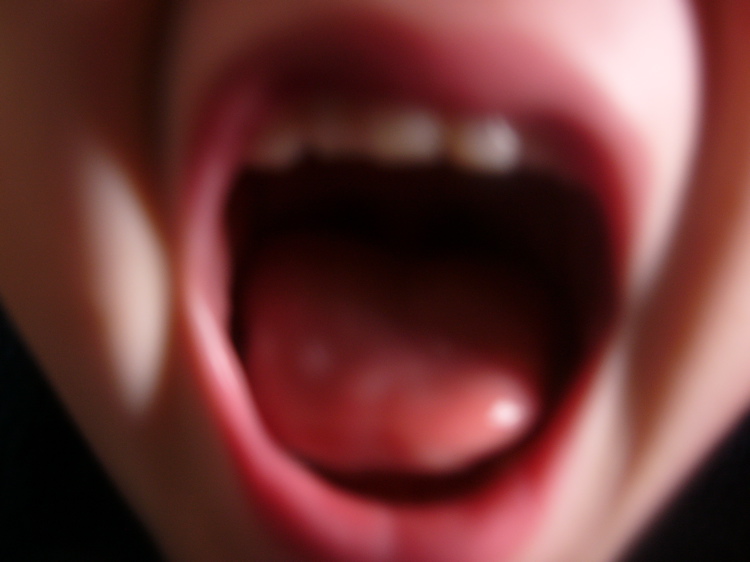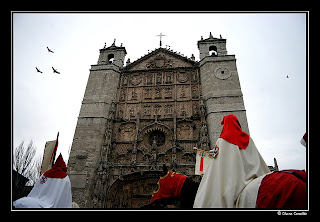Through the Eyes of a Penitent

"The road back to a lively faith is not a question of finding the right answers, but of living in a certain way, contemplatively... We must live in such a way that we give birth to God in our lives."
-- Fr. Ronald Rolheiser, The Shattered Lantern
Tomorrow is Palm Sunday, which marks the beginning of the Church's commemoration of the Passion of the Lord. In a Catholic country like the Philippines, this day sends families and clans to a fever pitch-- last minute arrangements are made for vacation plans, and for the devout, this marks perhaps one of the longest weeks in their entire calendar. For Palm Sunday is the start of a whole week of mourning and festivity, where statues and tableauxes depicting scenes from the Passion, some of which have been entrused to the same families for generations, are paraded in streets, where whole towns shut down at the moment of His death, where the whole world is seemingly plunged in darkness.
In Spain, the hermanos penitentes, known for their tall, conical hoods, immaculate robes and who are generally in charge of the week's festivities, are an almost universal sight. In the Philippines, however, these penitents have never been popular; and so when I had the chance to experience Semana Santa in Valladolid some nine years ago, I was haunted, awed, terrified and edified by the sight of these hooded men. Personally, I find Semana Santa in Valladolid to be vastly more sober than the Rococco splendor of Seville, and subsequently more interesting. But that is not the point of this post; rather, I will try to voice my thoughts on these hermanos penitentes, mysterious lot that they are.
If you ask some Protestants, they will generally give you a blank stare, or perhaps a mild laugh, whenever such subjects as the hermanos are brought up. To them, they are nothing but a bunch of superstitious men caught up in a flawed understanding of Christianity, that is, one of bloodlust, pain, suffering and death. The Protestants simply cannot comprehend why we Catholics do such things. They ask: Do we think we will be saved just by flogging ourselves in the streets? Do we Catholics honestly think that parading a bunch of statues is a sign of predestined glory? Do we think we can equal the sacrifice of the Lord by having ourselves crucified?
But what does Protestant faith actually consist of? For many of them, it is simply accepting that Jesus Christ is one's Lord and Saviour; but aside from this, many Protestants are otherwise spiritually dead. Theirs is a faith more akin to simple belief than a living, working faith. It is a simple matter of assent, and basically, nothing else. I find it ironic how many Protestants can blame Catholics for having a 'dry' spiritual life; they criticize ritual as being empty, make fun of devotions, and look down on those who embrace their sufferings as 'cursed by God'. And these are the same people who first allowed divorce in Christian matrimonial praxis, whose isolation of religion from daily life has led to the present day secularization of society. Who is honestly dead-er in this situation?
In this day and age of crisis, the word 'spirituality' brings up notions of bearded, unbathed hippies who practice a 'feel good' religion that overemphasizes the transcendence of self than belief in a Higher Power. Being 'spiritual' these days has become a synonym for laxity in Faith and an aversion to authority. However, true spirituality should not be seen as such. Spirituality goes hand in hand with religiosity; spirituality without religion is nothing more than positivist secularism, and religion without spirituality is mere ritual and nostalgic attachment. We should not see spirituality as some sort of disease, but more like a missing piece, a complement, rather than a detriment.The problem with people today is that we often prefer one extreme to the other. Thus there are people who are merely 'spiritual' and those who are merely 'religious'.
Father Ronald Rolheiser, O.M.I, has written perhaps one of the most well-known books on the subject of religion and spirituality, 'The Shattered Lantern'. The title of this book of course refers to Nietzsche's mythical man in 'The Gay Science', who, in an infamous scene, breaks a lighted lantern and proclaim's that philosopher's immortal words: 'God is dead'. The problem, according to Rolheiser, is that we try too hard in "developing a better rational and intellectual apologetic for the existence of God" that we lose sight of Him altogether. We have become blinded by the fact that we cannot seem to quantify God or to find a tangible proof of His existence, that we ignore the majesty of the mountains that surround us, the gentle music of a softly falling waterfall, the singing of the eagle's wings, the burning fire of the sun, and the silvery calm of the moon. It is not so much a problem of not being able to see, hear, feel or breath Him, but a question of developing the wide-eyed curiosity of a child at the things around him, or getting a better pair of lungs to be able breathe the cold mountain air that declares His praise. The problem, simpy put, is with us.
That is one of the reasons why I admire penitentes so much. Modern man has ditanced himself so much from nature and dwelt in hyperreality for so long that he has lost the gifts of his senses. These penitents-- whom many even in Church vilify as 'laughably outdated' or a proponent of a violent, bloody interpreation and praxis of the Faith-- have never forgotten the basic fact that they are above all human. Whereas modern man has desensitized himself and dwells only amidst a clean and sanitized environment, the penitent is not afraid to see blood, and admit to himself that he will one day die. Ironically, it is modern man, who, in his compulsion to sanitize himself and shun all forms of 'pain' completely who is ultimately the jaded one. The penitente, in his undying, childlike wonder, continuously adapts himself to the circumstances around him NOT by shying away from it, but by looking at them the same way a child might.
For Fr. Rolheiser, God, in the end, is not a monastic God, but very much a domestic God. In carrying those five-ton tableauxs of the various stages of His passion, and in disguising himself in his brotherhood's theatrical garb, the penitente is not so much putting on a show as he is showing something about him, his Lord, and enjoying the show at the same time. And while the path of the Lord is one of immense suffering and misery, it is the face of Christ, bent in sorrow and pain at His agonies, that pushes him through, the same face he hopes-- and strives-- to one day behold in the eternal beatitude destined for all men who follow that same path. We need to be like children again if we want God to come back to our lives.
Note: Visit Chema Concellon's Flickr site to see where I got my Semana Santa Valladolid pictures from. He's one of my favorite photographers there.
Also, I will be out until Spy Wednesday. I will try to have another essay ready by that time; in the meantime, though, here are my plans as outlined for Holy Week: on Wednesday, a post on confession, hopefully with my OWN pictures; then on Maundy Thursday, we will be doing the traditional 'visita iglesia', hopefully I will be able to get some good pictures of that. -Arch


































